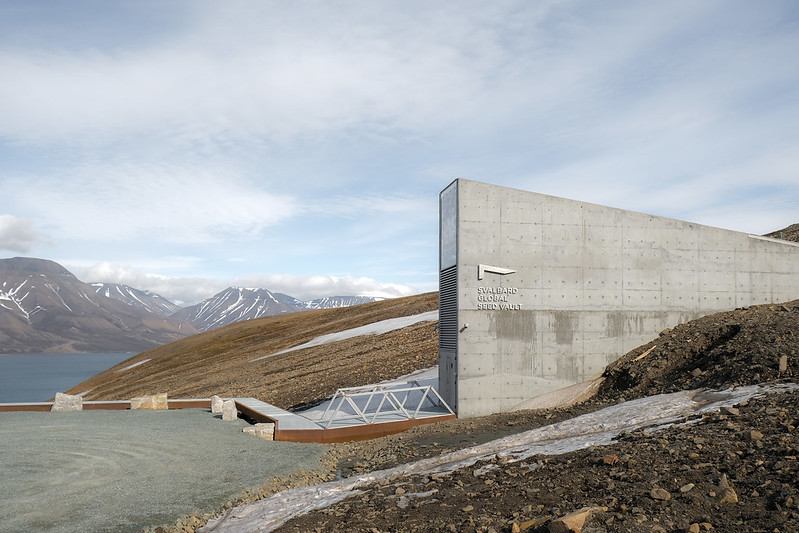The Svalbard Global Seed Vault: Protecting Crop Diversity
 In Svalbard, Norway, deep within a mountain at 150 meters, lies a significant refrigerated vault holding more than a million crop seeds from around the globe. Regional seed banks worldwide contribute duplicates of their seeds to this repository, ensuring their secure storage. Supported by the Norwegian government, this initiative aims to safeguard biodiversity and provide a safety net against potential global crises that could threaten the food supply.
In Svalbard, Norway, deep within a mountain at 150 meters, lies a significant refrigerated vault holding more than a million crop seeds from around the globe. Regional seed banks worldwide contribute duplicates of their seeds to this repository, ensuring their secure storage. Supported by the Norwegian government, this initiative aims to safeguard biodiversity and provide a safety net against potential global crises that could threaten the food supply.
The Importance of Seed Banks
Crop diversification plays a crucial role in sustaining healthy ecosystems and enhancing agricultural resilience. It mitigates soil erosion, enriches soil health and fortifies crops against pests and diseases. By planting a variety of crops, farmers can potentially shield their livelihoods from extreme weather and other adversities, ensuring that if one crop falters, others may thrive to offset the loss. However, crop diversity has sharply declined over the last 50 years. TIME Magazine reports that merely about 30 crops now supply 95% of the nutritional needs of humans. The Food and Agriculture Organization of the United Nations (FAO) adds that since 1900, there has been a staggering 95% loss in plant genetic diversity globally.
Natural disasters are the primary threat to crop diversity in developing countries. Flooding, drought, excessive heat and other unpredictable weather patterns, can wipe out entire fields of crops. The Svalbard Global Seed Vault protects crop diversity and prevents hunger by ensuring that crop species do not go extinct. The vault stores seeds and their duplicates, ensuring that agriculture can reintroduce them following catastrophic events, thus protecting global food security.
Marie Haga, executive director of the Crop Trust, an organization that operates the Svalbard Seed Vault in collaboration with the Norwegian government, emphasizes that crop diversity is essential to global livelihood: “Not too many think about crop diversity as being so fundamentally important, but it is. It is almost as important as water and air. Seeds generally as the basis for everything. Not only what we eat, but what we wear, nature all about us.”
Seed Banks Around the World
The Svalbard Global Seed Vault collaborates with more than a thousand regional seed banks worldwide. These banks collect, freeze and store seeds from various crop species. They send duplicates of these seeds to the Svalbard vault for secure, long-term storage. Operating much like an insurance policy, the organization protects these seeds against potential regional threats such as severe weather or conflict. Svalbard safely stores the duplicates should a regional seed bank’s supplies be compromised.
The Svalbard facility’s operations are important in war-ridden regions. In 2012, the International Center for Agricultural Research in the Dry Areas (ICARDA) had to move from its location just outside of Aleppo, Syria, in 2012 when the civil war threatened the facility’s security. In Afghanistan and Iran, violent conflict destroyed seed banks, compromising seeds that had not yet been sent to Svalbard.
Svalbard’s location in Northern Norway is optimal for the global seed vault due to its cold climate, which is essential for preserving seeds at -18° Celsius. The vault’s placement of 150 meters inside a mountain offers added protection against severe weather events, including extreme cold and avalanches. Apart from these natural conditions, Svalbard’s remoteness plays a crucial role in its security, making it unlikely to be affected by international conflicts. This combination of factors effectively safeguards the seeds, providing a critical backup for global agriculture.
Looking Forward
The Svalbard Global Seed Vault plays a pivotal role in preserving global crop diversity, acting as a vital insurance policy against environmental and man-made disasters. Securing more than a million seed samples from various regions ensures the continued availability of essential crops for future generations. The Svalbard Global Seed Vault continues to expand its collection and it can hold about 4.5 million seeds. This initiative can potentially maintain agricultural resilience and secure food supplies worldwide.
– Maren Fossum-Wernick
Maren is based in St. Paul, MN, USA and focuses on Global Health and Politics for The Borgen Project.
Photo: Flickr
